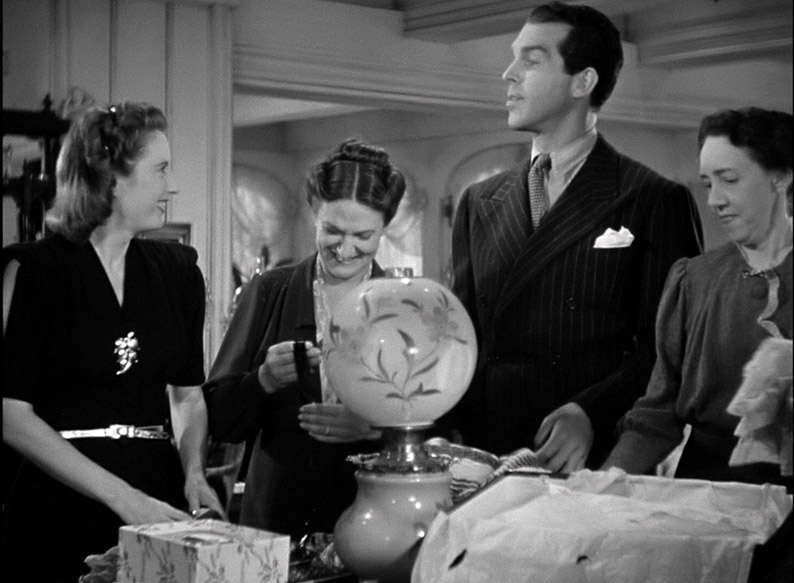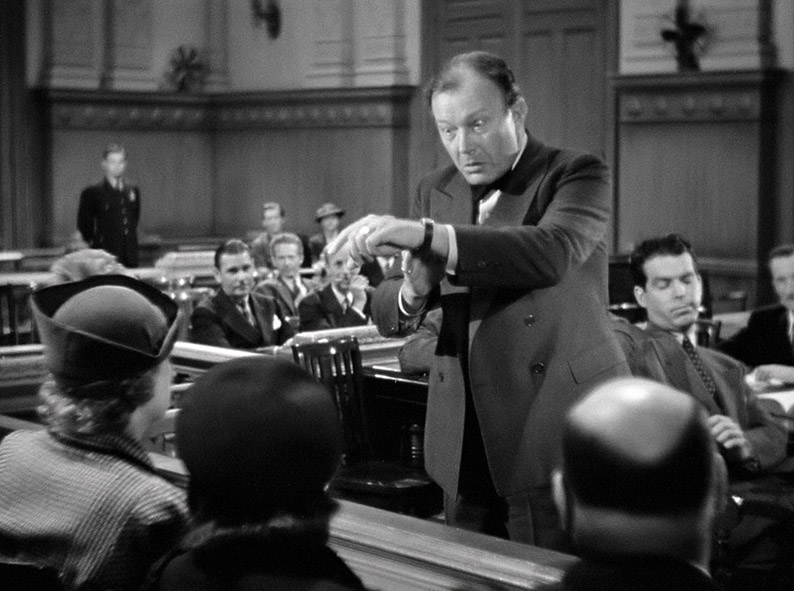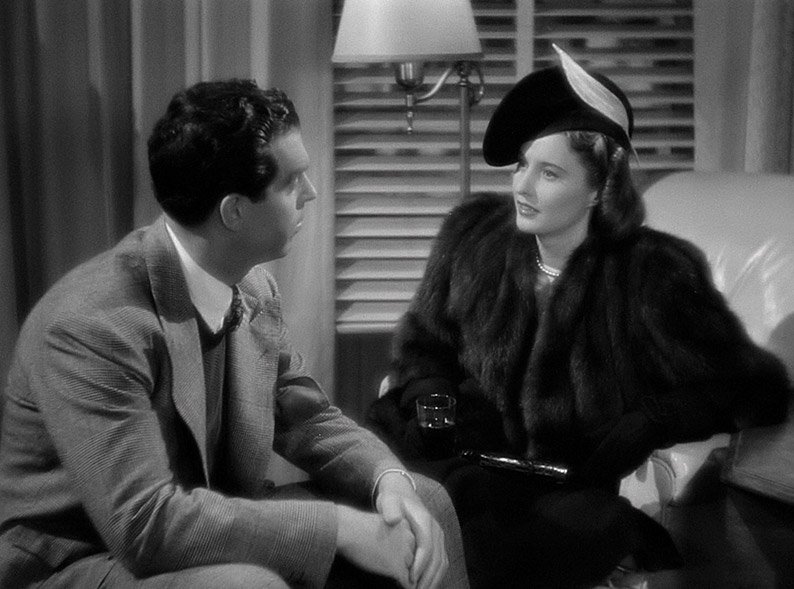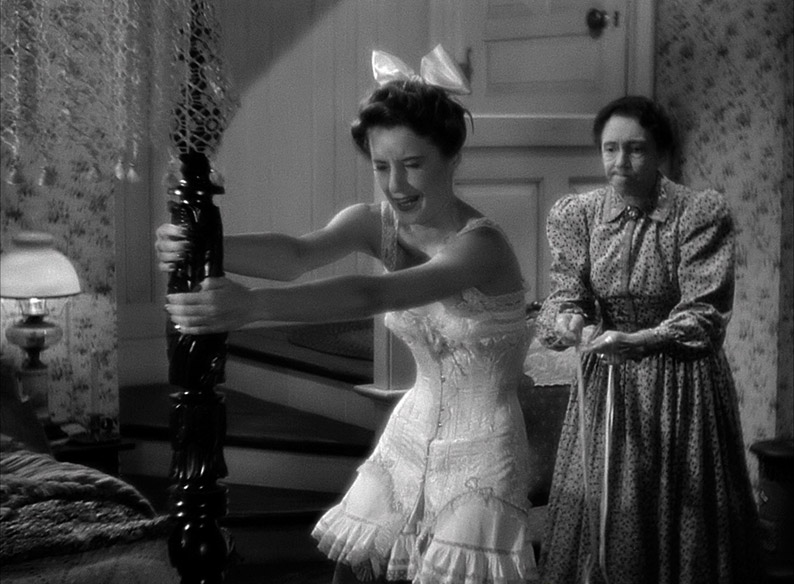|
Lee Leander (Barbara Stanwyck) is arrested stealing a bracelet from a New York jewellery store. Jack Sargent (Fred MacMurray) is set to prosecute her. As the trial is postponed over the Christmas period, Lee faces jail but Jack asks a bondsman to post bail for her...only to find Lee delivered to his apartment. Discovering that Lee is a fellow Indiana native, with nowhere to go to for Christmas, Jack offers to drive her to her family home...
Remember the Night tends to be regarded as a footnote in the career of its writer, Preston Sturges, in that it was his last film as a writer before he became a writer-director the same year (1940) with The Great McGinty. That won him his only Oscar and started his great streak through most of the decade. Sturges was so dissatisfied with what the actual director, Mitchell Leisen, did to his script, that he asked for a reduced fee for The Great McGinty if he could be allowed to direct it as well. However, the combination of their talents makes for a delightful film, which hasn't become a Christmas perennial though it would deserve to be one.

Leisen (1898-1972) was an art director and costume designer, having been Oscar-nominated in the former category for Dynamite (1929), before becoming a director. His background has sometimes told against him, with his films sometimes dismissed as good-looking and elegant trifles. However, he does get a signed credit at the start of the film. He has become known as a director for writers who went on to become major directors themselves, Billy Wilder as well as Sturges. Yet that elegance is visible in Remember the Night from the outset: note the opening sequence which sets up one of the two leads, her situation and kicks the plot into action in just three very mobile shots. Leisen is able to bring out the changes of tone and mood in Sturges's script. It's a romantic comedy, yes, but it begins and ends as a courtroom drama and takes in the road movie as well. In the scene where Lee and John visit her family home in Eltonville, she meets nothing but rejection from her mother, which stops the laughs in their tracks. Ted Tetzlaff's cinematography, in some scenes putting the actors in silhouette, at times resembles prototypical film noir.
Another thing Remember the Night is notable for is that it's the first teaming of Barbara Stanwyck and Fred MacMurray. They would act together in three more films, most notably Billy Wilder's Double Indemnity (1944). However, in this romantic comedy, their chemistry is evident, and you believe in the genre requirement that they get together, despite the obstacles in their way. There is one obstacle remaining at the bittersweet ending, no doubt mandated by the Production Code. Stanwyck (born Ruby Stevens, 1907-1990) was a year older than MacMurray, and had begun her career as a chorus girl, beginning her film career in a silent, uncredited as a showgirl in Broadway Nights (1927). She became a star in the Pre-Code era, with such then-controversial films as Night Nurse (1931), The Bitter Tea of General Yen (1932) and Baby Face (1933). However, she continued her stardom after the Code was enforced, from the later 1950s continuing her career on the new medium of television. Her troubled marriage to Frank Fay was allegedly the inspiration for the story of A Star is Born. She nails the part of the tough cookie, and admitted criminal, who softens over the course of the film, which takes place over about a week. (3 January is a Tuesday, so that makes it over Christmas and New Year 1938-1939.)
MacMurray (1908-1991) began his film career around the same time as Stanwyck, with extra work and bit parts from 1929. He went on to work with Sturges and Wilder in the 1930s, and was particularly adept at comedy, though his most celebrated role was as the hapless Walter Neff opposite Stanwyck in Double Indemnity. Later he was a regular star in Disney productions. In Remember the Night he also softens, from the tough prosecuting counsel who is warned to go easy as jurors often sympathise with female defendants. The supporting cast is strong too, though the role of John's African-American manservant Rufus (Fred "Snowflake" Toones, billed simply as "Snowflake") is of another time, let's say.

Sturges's original title for the film was Great Love, and found the script difficult to write. The story has some autobiographical elements, such as the theme of a love story blooming while on a journey. Remember the Night was Sturges's second collaboration with Leisen, after Easy Living two years earlier, and there are a couple of references back to that film. (At one point, Lee uses the false name Mary Smith, which was the character played by Jean Arthur in Easy Living.) Leisen's rewrites and shortening of the script put more emphasis on to Stanwyck's character. Sturges met Stanwyck on the set, and as a result he wrote a role for her in The Lady Eve.
Remember the Night was well received at the time, and is a fine film which certainly deserves more attention than it has had in the decades since.
Remember the Night is Indicator spine number 294, a single Blu-ray disc encoded for Region B only. Given an A certificate by the BBFC on its original release, it is now rated PG.
The film was shot in black and white 35mm in Academy Ratio (1.37:1) and Indicator's transfer is in the intended ratio, derived from a scan of a 35mm dupe negative. The results are excellent, with blacks, whites and greys all on point, and grain natural and filmlike.
The soundtrack is the original mono, rendered as LPCM 1.0. There's not much to be said here either: dialogue, music and effects are clear and well balanced. English subtitles for the hard of hearing are available for the feature but not the extras.
Commentary by Adrian Martin
Adrian Martin begins his commentary by mentioning the first time he saw the film, at the Melbourne Film Festival, in which someone claimed that Leisen simply didn't understand the subtleties of Sturges's script. Nonsense, says Martin, and goes on to demonstrate that for the next hour and a half. He also discusses Sturges's dramaturgy, structuring the film as eight sequences of ten minutes or so each, rather than the classic three-act formula. He also examines Leisen's approach as a gay man working in romantic comedy, the (then) most heterosexual genre there was. His sexuality made him the target of homophobia in Hollywood, with Billy Wilder calling him a fairy and his general dismissal as an interior designer rather than a director.

You May Laugh, You May Weep: Geoff Andrew on Remember the Night (25:14)
Geoff Andrew examines Remember the Night, covering the film's production and the contributions of Sturges, Leisen and the cast and elucidating the themes and changes of genre as it proceeds. Andrew talks about how the characters are able to change, including Sturges's use of irony. Sturges defined the story as one of a woman redeemed by love, and a man corrupted by it.
Outsider Status: Pamela Hutchinson on Barbara Stanwyck (25:32)
This is an overview of Barbara Stanwyck's life and career, from its beginnings to her last roles in film and television. That includes playing a lesbian in Walk on the Wild Side (1962), when there had been rumours about her sexuality for years. In fact, if she was gay or not, she certainly qualified as a gay icon. She was also a far-right Republican offscreen, backing the anti-Communist witch hunts of the 1950s. You'd imagine she'd have voted for Trump if she'd been around in 2016.
Lux Radio Adaptation of 25 March 1940 (54:33)
Lux Radio Adaptation of 22 December 1941 (54:07)
There were two radio adaptations of Remember the Night, using a cut-down version of Sturges's screenplay. In the first, broadcast two months after the film's release, MacMurray, Stanwyck, Beulah Bondi, Elizabeth Patterson and Sterling Holloway reprise their film roles. In the second, MacMurray and Bondi are still on board, but Jean Arthur takes over from Stanwyck. Bob Hope and Rita Hayworth play guest roles in the second production. Both plays are introduced by none other than Cecil B. De Mille, who in the first makes much of the fact that Leisen began his career by working for him. There's no mention of Sturges except in the end credits of the second production.
Trailer (1:49)
This begins "Confessions from the diary of a bad girl", which rather sets up expectations of a different, possibly racier, film than you might be expecting. It later sells it as "When good boy meets bad girl". Some scenes are just as well taken out of context of the film as a whole, as in context they would be major spoilers.
Image gallery
Seventy-two of them, which you advance via the NEXT button on your remote. They comprise production stills, lobby cards (in colour), the front page of Sturges's personal signed script, and poster designs (also in colour).
Hollywood Victory Caravan (19:37)
Made in 1945, this short film was designed to raise funds for War relief charities and was released after VJ Day. A slender storyline involving a young woman (Virginia Welles) attempt to reach her conscripted husband is an excuse for four musical numbers from the original stage version of the Caravan (from 1942) and appearances from stars such as Bob Hope, Humphrey Bogart and Barbara Stanwyck.

Book
This limited edition includes a double-sided poster and an eighty-page book. After film credits, it begins with a new essay by Rick Burin, "A Good Dose of Schmerz". While claiming that Remember the Night is as good as any of Sturges's own films as director, he does cover Sturges's career from his breakthrough into Hollywood following stage success. Sturges clashed with Leisen on both the films they worked on together, with Sturges claiming that Leisen had no flair for comedy and more interested in interior design. However, Easy Living and Remember the Night were the only two of his films of which he kept 16mm copies, so maybe he was secretly reconciled to them after all. Burin also looks at the film as part of another great run, that of Stanwyck from 1939 to 1941, in which she performed some five of her great roles.
"Why Actors?" is a 1939 on-set report by J.D. Spiro of the Detroit Free Press, concentrating on the studio-bound set design, to the extent that you wonder if they ever needed actors. "'Snow' Flies Today: City Goes Hollywood", also from 1939, by Ross Mason of the Windsor Star, covering the second unit's shooting of the scene where John and Lee escape over the Canadian border. "Tallest Star in Hollywood Has Heart to Match his Size" by Lily May Caldwell for the Birmingham [Alabama] News, is again from 1939 and more or less speaks for himself. (MacMurray was 6'4" and John Wayne may have had something to say about who really was the tallest star in Hollywood.) Following a classified ad enabling you to win tickets for Remember the Night, "Jack-of-All-Trades" by Frederick C. Othman of the Allentown Morning Call is from 1940, in between the releases of Remember the Night and The Great McGinty, interviews Sturges on the set of what would be his second film as writer-director, Christmas in July.
"Swing High, Swing Low: Mitchell Leisen in Perspective" is a later (1994) and much longer piece by Dennis Drabelle for Film Comment. This is an overview of Leisen's career, without much in the way of mentions of Remember the Night, and aims to rescue his reputation from that of being, as Drabelle puts it at the start, the nemesis of writers and future great directors, Sturges and Wilder. The essay establishes Leisen's skill with actresses in romantic comedy especially, though also points up some homoeroticism in his work. The book concludes with extracts from contemporary reviews, notes on and credits for Hollywood Victory Caravan, and plenty of stills.
|